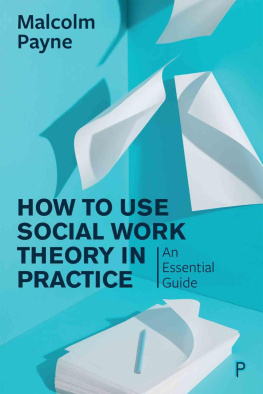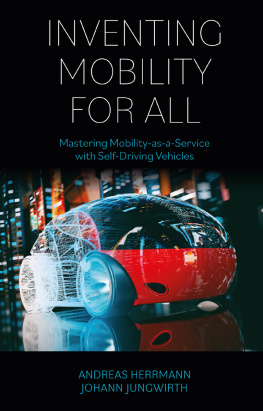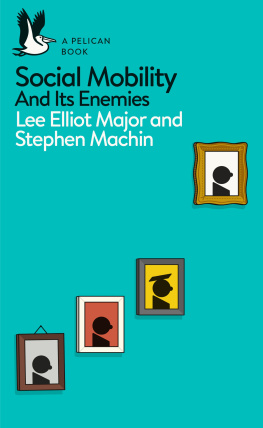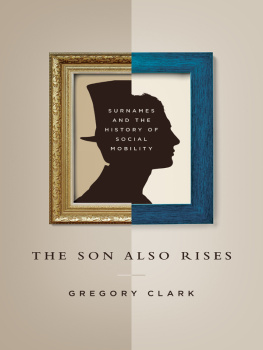

First published in Great Britain in 2017 by
Policy Press University of Bristol 1-9 Old Park Hill Bristol BS2 8BB UK Tel +44 (0)117 954 5940 e-mail
North American office: Policy Press c/o The University of Chicago Press 1427 East 60th Street Chicago, IL 60637, USA t: +1 773 702 7700 f: +1 773-702-9756
Policy Press 2017
British Library Cataloguing in Publication Data
A catalogue record for this book is available from the British Library
Library of Congress Cataloging-in-Publication Data
A catalog record for this book has been requested
ISBN 978-1-4473-1065-5 paperback
ISBN 978-1-4473-1066-2 hardcover
ISBN 978-1-4473-1069-3 ePub
ISBN 978-1-4473-1070-9 Mobi
ISBN 978-1-4473-1067-9 ePdf
The right of Geoff Payne to be identified as author of this work has been asserted by him in accordance with the Copyright, Designs and Patents Act 1988.
All rights reserved: no part of this publication may be reproduced, stored in a retrieval system, or transmitted in any form or by any means, electronic, mechanical, photocopying, recording, or otherwise without the prior permission of Policy Press.
The statements and opinions contained within this publication are solely those of the author and not of the University of Bristol or Policy Press. The University of Bristol and Policy Press disclaim responsibility for any injury to persons or property resulting from any material published in this publication.
Policy Press works to counter discrimination on grounds of gender, race, disability, age and sexuality.
Cover design by Soapbox Design
Front cover image: Judy Payne and Geoff Payne
This book has been optimised for PDA.
Tables may have been presented to accommodate this devices limitations.
Image presentation is limited by this devices limitations.
Contents
In writing this book, I am grateful to have been able to reproduce data and short quotations from a variety of sources. These are formally acknowledged in conventional form where they are included; brief quotations and data have only been used to the extent accepted under fair dealing principles. The Commons Licence, which provides access to data from the National Office for Statistics, has been a particularly valuable public asset.
Although in the body of the text I acknowledge several colleagues who have made specific contributions, I can only record my general gratitude to many colleagues, too many to list by name, for their much appreciated exchanges of views about mobility over a number of years. They include those at Aberdeen University involved in the original Scottish Mobility Study; members of the Cambridge Social Stratification Seminar and CREST (Research Centre for the Study of Socio-Cultural Change) at Manchester University; participants in numerous British Sociological Association Annual Conferences and the 2016 Every One a Winner Conference funded by York University, and the Sociology Teaching Group at Newcastle University (including my long-suffering students!). They are of course not responsible for what is written here, and I hope they will not be offended if they are not individually acknowledged by name. However, as always, I must record my gratitude to Judy Payne for her patience and common sense in deflating some of my wilder ideas, as well as her work on the cover photograph. Finally, I am grateful for the excellent support of the editorial team at Policy Press.
This book is about the political, economic and moral salience of social mobility in Britain today. The way that, and the extent to which, people move or fail to move from one position in society to another up or down the social hierarchy, through education and employment is one of the central processes in contemporary society. It involves issues of inequality in individuals opportunities to use their talents in our society, the fairness and legitimacy of social and political status quo, and the effective use of the countrys most basic resource: its people. Not only are differential mobility opportunities a form of social inequality in themselves, but belief in the future prospect of potential improvement at least for ones children and thereby in the legitimacy of mobility can make current social inequities easier to bear.
Social mobility is also one of the most misunderstood processes of our time.
This is ironic, because social mobility has been moving up the political agenda since the turn of the century at an astonishing rate, with media coverage increasing literally tenfold in the last decade (see chapter Three). In 2014, a report observed how: in recent years government has introduced a number of initiatives to improve social mobility and a Social Mobility and Child Poverty Commission (SMCPC) has been created to monitor progress in this area right across government policy a clear indication of broad political support (Brown 2014, 9).
Immediately before this book went to production, the European Union (EU) referendum and its result blew regular political issues away. But all five of the Conservative leadership candidates except for Andrea Leadsom invoked social mobility in their campaign launch speeches (Fox 2016; Gove 2016; Johnson 2016; May 2016a); Mays inaugural speech as Prime Minister highlighted pledges to improve opportunities for everybody to go as far their talents could take them (May 2016b). However, because of its complex nature, understanding social mobility and its social significance has challenged public commentators and non-specialist academics alike.
The result has been too much loose talk about needing more mobility without clarity about what mobility means or what its consequences might be. Although in common parlance mobility is generally seen as a comparison across generations between a persons family background and his or her adult career achievement there has been a perhaps inevitable lack of precision in the definitions implicit in public debate. Defining mobility has even been a challenge to highly trained academic specialists in mobility analysis. But to discuss it properly, and to understand what is going on, requires a more exact specification of mobility and how it is to be measured (which can be found in the Appendix of this book) and an upfront honesty about ones moral and political stance. I am happy to make my own position clear: with regards to the specific kinds of mobility outlined in this book, I believe we need a more mobile and open society in which there is greater equality of outcome and compassion for those who remain anchored to the bottom of society.
Of course, the term mobility is convenient shorthand, and will be used as such in what follows. Unless otherwise qualified, the meaning here will imply amounts of movements (and lack of movements) by individuals up and down the social scale, calculated over two generations and usually across seven classes . The main implications of this definition will be explored in the next chapter. The aim will be to reduce some of the collective confusion by taking a fresh look at mobility in a way that makes sense to a wide readership (rather than a standard introductory text aimed solely at mobility analysts or social science undergraduates, although it can of course be used by them).
The next chapter will also present evidence from a number of high quality sociological surveys using comparable and widely accepted methods of analysis and stretching back to 1949. This work covers people particularly men in the labour force and compares their own current social/occupational positions with those of their parents. In the technical jargon, this is the amount of absolute intergenerational social mobility (in England and Wales, where the level of mobility is a little higher than in Scotland and Northern Ireland). However to enter the first of what will be a number of caveats while it is true that absolute mobility rates have been higher than commonly assumed, many of the movements have been short-range; that is, to new destinations that are different from the original background but not hugely so and not from one end of the social scale to the other.














